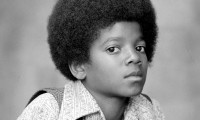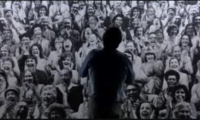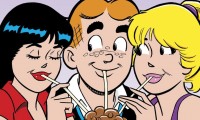Oscars, “11 Year-Old Anna Paquin Winning Best Supporting Actress” (1994)
What is Anna Paquin thinking at this moment? She’s been told that being nominated for an Oscar is a big deal. And now she’s won. The grown-ups are applauding her. Her parents are happy. She’s made it! She looks genuinely shocked that her name’s been called out, almost to the point of distress, and she’s adorable as she struggles to compose herself.
Oscars, “Halle Berry Winning Best Actress” (2002)
Halle Berry is not so adorable. She’s overwhelmed too, genuinely, but it’s not so easy to love her for it. It’s just vaguely embarrassing. Some of the actors in the audience only offer reserved applause, as if they don’t approve of this messy display of tears, as if they fear she might expose something dark and ugly that would somehow implicate everyone in the room. Yes, it’s probably true that there is political significance to her win, and that in certain ways she is a “vessel” carrying the cargo of other people’s sacrifices. But Halle Berry is also crying for herself and her own sacrifices. She’s 36 years old. She’s been in the business a long time and now she’s been officially accepted. In spite of the odds and against the odds, she’s made it to the top.
I’m certain that Anna Paquin is not thinking about the sacrifices of other child performers before her. Or of her own sacrifices. She’s too young. She’s not thinking of the countless auditions and rejections, the years spent living alone in a filthy North Hollywood apartment, the Joe jobs that paid the bills but left her more bitter than determined, the acting teachers who took what little money she had and then told her that she’d never really have “it.” She’s not thinking of the pregnancies she cut short and the failed relationships, of the late nights spent crying, when she feared her hard work would amount to nothing, when she imagined returning home to the naysayers of her little town and letting down all the people who ever believed in her. She’s not thinking about the loss of her mother and how it made her view “acting” very differently, as a kind of ridiculous indulgence. She’s not thinking of the year when she could only drink herself out of depression, or of the extreme dieting and botox treatments she felt pressured into accepting just to get a small recurring role on a bad TV series. She’s not thinking of how her early optimism and confidence turned into weariness and shame, and how she began to despise herself for continuing to hope, and for the compromises she was making. She’s not thinking of the big break that came too late, and of the strange trauma and indignity that accompanied her rise to fame.
David Lynch, “Mulholland Drive: Someone Is In Trouble” (2001)
Only one other child actor has won an Oscar: Ten year-old Tatum O’Neal in 1974. Shirley Temple, who was the first child to receive an honour from the Academy, was given the “Juvenile Award.” Back then actors under eighteen were considered to be at an unfair disadvantage if nominated alongside their adult counterparts. These days, the Academy might want to think about creating an “Adult Award,” so that wizened actors with atrophied brows don’t have to be judged against glowing, malleable children, who have yet to experience the agonies of adolescence, let alone the trials of adulthood. Since birth they’ve had a camera pointed at them 24/7, and have figured out that “all you gotta do is act naturally” is a lie: Acting naturally means acting like this. So although a child actor is unburdened by fully developed selfhood, with its barriers and reluctances, she is still highly sensitive to the desires of adults. Children are chameleons of the highest order and they live to please. They’re like fine-tuned instruments and adults need only find their own unique way of using them.
Charles Lamont, “Shirley Temple In Polly Tix In Washington” (1933)
Time Magazine called Shirley Temple a “prodigy.” Why endow this unformed little human being with extraordinary powers? You can’t really compare her to other famous whizkids, like Carl Friedrich Gauss or José Raúl Capablanca who at least excelled in measurable pursuits. I just see a little girl playing dress up. I can easily imagine the director behind the camera prompting all of her grown-up moves, just like the mothers on “Toddlers and Tiaras.” They say young Shirley Temple had a special charisma that set her apart. Can’t you say that about any particularly cute, exuberant kid who shows up on a screen? Charisma is in the eye of the beholder, which is something Max Weber pointed out about a hundred years ago.
Jane Campion, “The Piano: Alisdair Sends George a Message” (1993)
The camera likes little Anna Paquin. She sparkles on screen. Still, I ask, why was she given an Oscar for this performance? Precisely because she was just a little girl? Did we feel ashamed for putting her through those horrible emotions just so that we could tell another one of our stories? One of Paquin’s co-nominees was Rosie Perez. She played a guilt-ridden plane crash survivor in “Fearless.” Watch this clip and decide whether it makes sense to compare the performances of these two actresses.
Peter Weir, “Rosie Perez In Fearless” (1993)
We ask actors to call up the ugliness inside, to expose their most intimate selves with unguarded, childlike willingness. It’s ironic that what we celebrate most in child performers is their emotional maturity and wisdom. What a lot of pressure to put on a child! At least Anna Paquin didn’t have to play a Washington call girl, but like Shirley Temple, she did what she had to to make the adults around her happy. That’s what kids do. She didn’t have the chance to really consider her options before committing to an acting career. She’d already been thrown into the fire and it was too late to turn back without disappointing a lot of people.
Larry Charles, “Bruno: The Hottest Baby Photo Shoot” (2009)
Say you had a cute little girl, and she really enjoyed painting, and her paintings were even kind of good. You’d encourage her right?
Aelita Andre, “Aelita Andre: Prodigy of Color Exhibition in New York City” (2011)
Aelita Andre is described as a “Prodigy of Color.” I wonder: Wouldn’t any child love to squirt gallons of top-quality paint onto prepared canvasses in a personal studio? Are the pre-fabricated Viennese masks meant to represent Aelita’s inner child? I appreciate the beauty of some of Andre’s paintings, even if they do feel accidental. “Whatever their aesthetic charm,” writes Noah Horowitz in the New York Times, “her canvases are hardly novel from a formal vantage, nor do they provide added meaning below the surface.”
But the question that interests me is not whether her paintings are good, but rather: Why do her parents feel the need to brand her creativity? Why make her into something more than an innocent, little kid who makes colourful drip paintings?
This video, with its cloying, contemplative music, moody close ups of Aelita’s paint-flecked hands and face, and slow pans over her paintings, makes an insistent plea. It tries to persuade us that Aelita is closer to the spirits than other mortals. Look how intently she gazes into the light! Look at her pour that blue paint like a young Jackson Pollock! Look at her concentration. Clearly she is unfettered by self-consciousness, still in touch with the prenatal state, maybe with the Gods themselves. Her paintings are spontaneous emanations of an unadulterated truth, of the innocence she represents. And yet see how she stands up and says “Finished!” Like someone who approaches her work with real intent, with the authority of a mature artist. It’s as if she’s already been impregnated by culture. Hey Art World! Here is the Virgin Mary you’ve been looking for.
Aelita Andre’s parents have decided or consented to make their little daughter into a celebrity (or circus act, depending on your point of view). They put her in cute dresses and film every move she makes, but are careful not to appear in the frame themselves. They want to create an aura around her and sell her as an extraordinary person with extraordinary gifts. Judging from the girl’s surroundings, it’s not for the money, but there is a market for the girl’s work (one of her paintings sold for $24,000), which means there’s a market for her story. Child prodigies sell.
I wonder if our willingness to exalt child performers comes partly from our wish to restore lost time. We can’t wrap our heads around the fact that we all once had this kind of potential. We want to convince ourselves that talent is innate so that we don’t have to face our own failures. We make them want what we want. We prop them up and tell them what to say. We show them how we would have done it. We put them in the spotlight and hope that they will achieve the things that we never could so that we can enjoy a few vicarious triumphs.
AmericasGotTalent, “America’s Got Talent YouTube Special: Jackie Evancho” (2010)
A little girl dressed up like a big girl to sing like a big girl. Why do you want me to go on that TV show? “Because you’re a natural, you’ve got a gift, you’re a star, you’re perfect!” What narcissistic injuries do these children suffer when they inevitably disappoint? I suspect it’s even harder for well-prepped pseudo-prodigies like Jackie Evancho, the kind who turn up on The Ellen Degeneres Show every couple weeks. Evancho obviously has a very long way to go before she matures from a shaky ventriloquist into a true artist (as Tim Page argues eloquently in the Washington Post). But no, we tell her she’s arrived already, her potential is fulfilled, she’s there. This is a form of abuse and we do it for our own sake.
Today these little girls repair our broken dreams and take charge of our unfulfilled desires. Tomorrow they are ex-little girls weeping hot tears of self-pity. In David Lynch‘s movie, the Betty Elms character leaves Deep River, Ontario to make it big in Hollywood. Soon she’s waitressing to make ends meet. Her drab, disappointing existence leaves her depressed and isolated. She realizes that “something bad is happening,” and to cope, she creates an elaborate fantasy life in which she is a happy, up-and-coming actress who nails her auditions and seduces the people she meets. But in reality, Betty over identifies with a glamorous and successful woman, almost like a fantasy double of herself, and it’s endlessly humiliating. She hires a hit man to take the other woman out. Horrified to learn that the hit has taken place, Betty shoots herself in the head.
Cry for yourself, or for the confabulated, pretend version of yourself who lived the life you wanted, but keep the kids out of it.
David Lynch, “Mulholland Drive: Llorando” (2001)
– Amy Rutherford






